Family Office Study: Taking Aim At Hedge Fund Operational Risk
Introduction
Family offices were some of the earliest adopters of hedge fund investing. Today, they continue to be large allocators to hedge funds both through direct investments, either under their own guidance or in consultation with investment consultants, and indirectly through vehicles such as fund of hedge funds.
Despite their continued enthusiasm for the hedge fund space, what has been less clear is whether or not family offices have similarly embraced the development of operational due diligence programs to keep pace with the rest of the hedge fund investment community. In an attempt to shed light on this topic Corgentum Consulting, LLC ("Corgentum") conducted a survey of family offices to better gauge trends and practices with regards to their operational due diligence efforts.
The survey results outline that despite their continued enthusiasm for the hedge fund space, family offices have been late adopters of institutional quality operational due diligence as compared to other investor groups.
What Is Operational Risk and Why Does It Matter?
Operational due diligence refers to the process of analyzing operational risks. Operational risks can be thought of in part, as those risks that are not purely investment related in nature and arise from the daily management and business operations of the fund. These operational risks run the gamut from traditional back office trade operations to counterparty and compliance related risks.
Beginning with the Madoff scandal in 2008, there has been an unfortunate continuing stream of hedge fund frauds and fund failures due in part to operational reasons. Investors that have not focused on operational due diligence have increasingly lost money with these failed funds. As a result more hedge fund investors, have reevaluated their approach to due diligence. In addition to fraud related concerns, in light of the global economic downturn, hedge fund investors have accepted that it is increasingly challenging for hedge fund managers to generate sustained profits. As a result investors are increasingly focusing on hedge funds as not just trading desks,but businesses where strong operations can add real value towards creating and protecting profitability.
The past few years have realized a radical shift in the investor resources expended in evaluating non-investment related risks. As a result today, many investors more fully incorporate a review of operational risks into their overall hedge fund screening process. Additionally, this increased investor focus on hedge fund operational practices has caused many different types of hedge fund investors (i.e.- endowments, foundations, pensions, fund of funds etc.) to give more weight to these operational considerations in their overall asset allocation decisions.
While the survey data suggests that family offices are late to the party, the good news is that they have refocused on operational risk in hedge funds and are seemingly more serious about operational due diligence than ever before at taking aim at operational risk.
Study Approach
Corgentum conducted a survey of approximately 120 family office members. The individuals included in this study covered a diverse cross section of investment, operational and direct family members at either single family offices ("SFO") or multi-family offices ("MFO") throughout the US, Europe and Asia. The one requirement to be included in this study was that those surveyed were affiliated with family offices that maintained either current investments in hedge funds , or had made an allocation to hedge funds within the past five years.
Direct Hedge Fund Investment Approaches
The survey first sought to analyze the operational due diligence practices of family offices that made direct hedge fund investments. As indicated above, the results indicate that the overwhelming majority, 76%, currently perform some sort of operational due diligence on their direct hedge fund investments. The respondents indicated that this operational due diligence was either performed directly by family offices themselves or by their third-party investment consultants.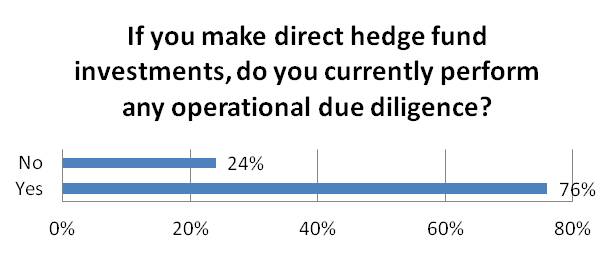
Confidence Indicator
The next survey question focused on those family offices that do make direct hedge fund investments and either perform their own operational due diligence or have an investment consultant perform it on their behalf (i.e. - the 76% indicated in the previous question). Surprisingly, a majority of this group (73%) indicated that they do not feel confident that they or their consultants have the capabilities to perform effective operational due diligence. In regards to their own direct operational due diligence efforts, many survey respondents expressed a lack of training or knowledge with regards to the specifics of fund operational practices.
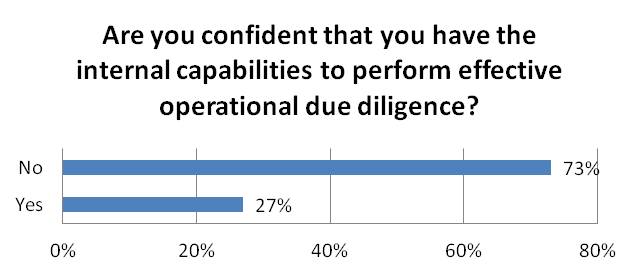
Even among those respondents that felt confident they understood the basics of traditional hedge fund operations (i.e. - processes such as how a trade is executed, settled and reconciled) there were several different reasons expressed as to obstacles they faced which hampered their ability to perform what they deemed to be "effective" operational due diligence including:
- The difficulty presented in comparing operational practices across different hedge funds
- A lack of training in evaluating the potential pitfalls and manager conflicts in operations
- A lack of information about industry wide best practices in different operational areas
In regards to the work of investment consultants, many family office respondents felt that while consultants did have detailed investment due diligence capabilities, on the whole they lacked the staff and expertise to detect most operational problems including fraud. Of note, hedge fund fraud in particular, as outlined in the questions below, was a key concern of family offices.
Turning to the 27% of family office respondents that felt confident that they, or their consultants, had the capabilities to perform effective operational due diligence, only a handful (i.e. - less than 5%) of these respondents indicated that had been motivated to focus on operational due diligence for reasons including:
- they had either direct exposure to fraud
- knew someone that had losses from fraud
- they had been previously in funds that had what they deemed to be operations problems
While, the remaining respondents (i.e. - over 22% of the total 27%) did not have such experiences, they indicated that their confidence to perform effective operational due diligence was bolstered by efforts they made to:
- Increase their internal competency and education about operational risk and operational due diligence (35%)
- Engage in dialogues with their investment consultants about the consultants operational due diligence processes
These responses suggest that investors which dedicate to more time to learning about hedge fund operational risk as well as engage in discussions with third-parties who may perform operational due diligence in their behalf, then feel more confident in their abilities to conduct operational due diligence. Therefore, the confidence, or lack thereof, felt by family offices with regards to their ability to perform effective operational due diligence may be not only a function of their actual capabilities but the family offices perceptions of their, and their consultants, capabilities as well.
Operational Due Diligence History
The majority of family office surveyed (82%) indicated that either family offices themselves directly, or their investment consultants as relevant, were not performing operational due diligence reviews two years ago. It should be noted that many of the respondents indicated that their consultants may have incorporated elements of operationally related matters into their overall due diligence, those who responded "No" felt that there investment consultants were not employing dedicated processes centered around operational due diligence two years ago.
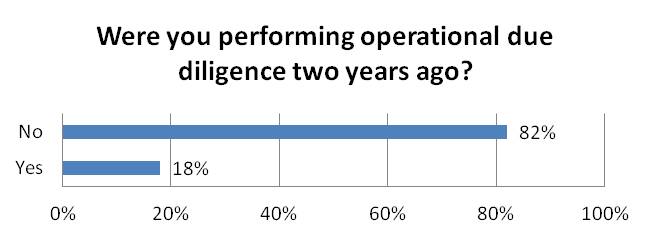
Similarly, respondents that answered "No" regarding their own operational due diligence processes indicated that similar dedicated processes were not employed by them internally as well.
This data is in contrast anecdotal evidence from Corgentum research among other investor groups that do make direct hedge fund investments the majority of which had begun performing some sort of operational due diligence two years ago. Additionally, as noted above, this 82% figure is in stark contrast to what survey respondents indicated were current approaches towards operational due diligence.
As indicated above, 76% of family offices surveyed indicated that they, or their investment consultants, are performing operational due diligence today. This represents a positive marked shift in the resources allocated by family office towards operational due diligence.
Minimum Standards
Acknowledging a key weakness associated with a lack of maintaining a documented operational due diligence process, the majority of family offices (68%) indicated that they do not feel that their, or their investment consultants, operational due diligence processes adheres to a minimum consistent level of review. Reasons for this indicated by the respondents included:
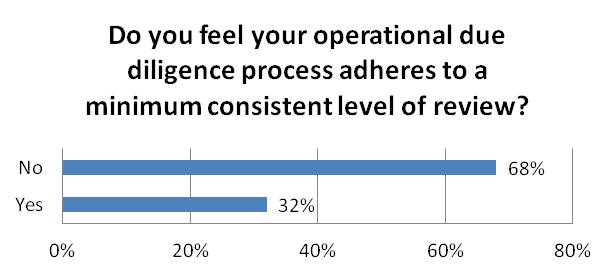
- Challenges in developing minimum standards across different hedge fund managers and strategies
- A lack of confidence in setting a floor amount as to how much should be the minimum operational due diligence performed
- Concerns that a too rigorous minimum standard might be too difficult to apply
- Perceived lower risk for certain strategies where they believe less due diligence is required, particularly true for liquid strategies such as long/short equity;
- Concerns that once a minimum standard was in place, the family offices would have to go back to hedge fund managers in which they have existing investments and perform more detailed operational due diligence
As outlined below, without such a minimum standard family offices inadvertently are potentially exposed to a number of problems in conducting operational due diligence.
Process Documentation
The bulk of family office respondents (79%) indicated that they, or their investment consultants, did not maintain a documented operational due diligence process. This is in contrast to the only 21% of respondents which indicated that they maintained a documented operational due diligence process. This 21% is figure is even more surprising when framed against the 76% of those respondents who indicated that they currently performed operational due diligence on their direct hedge fund investments. The juxtaposition of these responses suggest is that, there currently exists a disconnect in the family office space between a trend of increasingly performing operational due diligence and a distinct lack of attention paid towards developing a documented operational due diligence process.
This is a potentially dangerous trend worth highlighting. By not maintaining a documented operational due diligence process, family offices and their consultants open the door to several potential problems including:
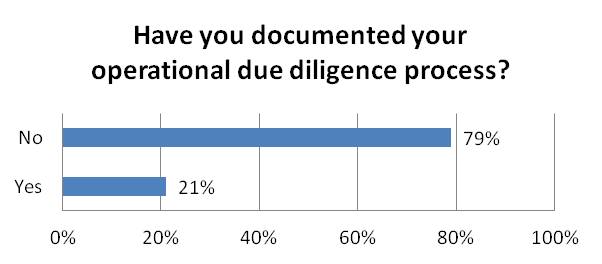
- Lack of minimum standards - typically when an operational due diligence policy is not documented different managers receive more or less rigorous operational reviews above and below a minimum level. It is easy for investors to fall into this trap for a number of different reasons. An example of this is when certain hedge funds may voluntarily provide more information as compared to other funds that are more reactive to providing investors only with the information they request. If family offices do not have minimum standards in place, they may not for example attempt review a hedge funds historical audited financial statements across the same time periods.
- Process inconsistency - as outlined above, no two hedge funds are created equal and these differences can result in investors without documented policies and minimum standards having inconsistent operational due diligence reviews across hedge funds. With a documented process not only should every fund manager receive a minimum consistent level of review, but the way in which these items are reviewed should be materially consistent. Continuing our audited financial statement example, without a documented process a family office may analyze fund manager expenses detailed in the audits year-over-year for one fund, but just look at the most recent years expense ratios for another fund. These types of inconsistencies can then represent a floating standard by which an investor inconsistently evaluates the same key fund operational characteristics.
- Process documentation differences - when an operational due diligence policy does not exist, the way in which the process is documented often suffers as well. This is important to note for several reasons. Firstly, the way due diligence information is documented is often utilized by those not directly involved in the operational due diligence process to reach some sort of conclusion as to whether or not there is significant operational risk in place at a hedge fund. If information is not presented in a consistent format, there is the potential that key operational risks may be either omitted entirely or not fully documented. Secondly, the way in which an operational due diligence process is documented serves to construct a due diligence file upon which future ongoing monitoring can occur. Without an operational due diligence policy which outlines the requirements for documenting the review process, the ongoing monitoring process may be handicapped by inconsistent initial review documentation.
Most Important Hedge Fund Operational Risks
Family office respondents overwhelmingly (57%) indicated that the risk of fraud was their paramount concern. Family offices cited the reasons for this importance placed on fraud as including the recent memory of hedge fund frauds such as Madoff and more recent frauds among smaller hedge funds and advisors as well as the overall perceived riskiness of hedge funds internal controls.
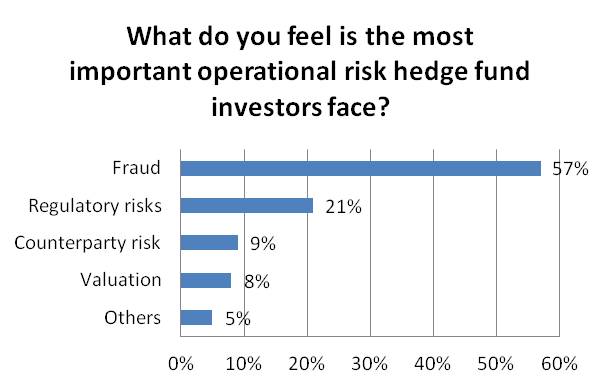
Concerns of fraud were seconded by regulatory risks (21%). Respondents indicated that the reasons for viewing regulatory risks as the most significant included a general consensus that the hedge fund regulators are increasingly scrutinizing hedge funds, government crackdowns on insider trading such as the prosecution of Galleon Group's founder Raj Rajaratnam, and the recent SEC registration requirements for hedge funds.
After these top two categories there was a significant disparity among the other types of operational risk which family offices found important including counterparty risk (9%), valuation (8%) and others (5%). The type of risks included in the, "Others" category included a wide range of responses including risks from service providers, personnel turnover, reputational risk, legal risks and technology related risks.Surprisingly family offices did not reference certain operational risks traditionally thought to be important concerns for investors including traditional back office operational controls around functions such as trade processing and cash as well as other operational risk categories such as custody insurance, tax management and operational transparency.
Conclusion
Family offices have begun to refocus on operational risk in hedge funds. While they have made recent significant progress towards developing more robust hedge fund operational due diligence programs, there is still a long way to go. The survey data suggests a number of opportunities for fine tuning the ways in which they, and their investment consultants, approach diagnosing and monitoring operational risk. In summary, the results of this survey indicate:
- Almost one-fourth of those family offices surveyed (24%) indicated that they, or their consultants, do not perform any operational due diligence
- The majority of family offices (73%) indicated that they do not feel confident that they, or their consultants, have the capabilities to perform effective operational due diligence. This is in stark contrast with the 76% that stated that they actually perform some sort of operational due diligence.
- Only 18% of those surveyed indicated that their family office has begun to perform operational due diligence within the past two years. The remaining 82% indicated that they were not performing what they deemed to be operational due diligence two years ago.
- Only 21% of family offices maintain a documented operational due diligence process
- The majority of family offices (68%) feel that their operational due diligence processes do not adhere to minimum standards. This results in inconsistent due diligence processes where some hedge funds receive light touch reviews based on perceived lower risks. This was particularly true for more liquid strategies such as long/short equity.
- Family offices are still overwhelmingly concerned with fraud. 57% of them stated that it was the largest operational risk facing investors. Other risks considered to be important were regulatory risks (21%) and counterparty risks (9%)
For More Information
Family Office Study: Taking Aim At Hedge Fund Operational Risk (1342Kb PDF)
